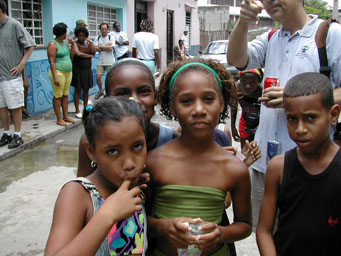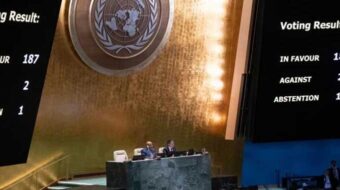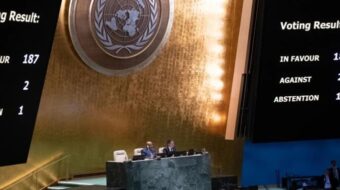
Editor’s note: The article below is in response to a recent declaration signed by a number of African Americans calling on Cuba to end “racial discrimination.” The document was circulated by a Cuban exile living in Brazil, Carlos Moore. PW will continue to follow this story.
It would be absurd to think that in Cuba, there are no racial problems, negative stereotypes, discrimination or racism, not just as burdens but also as something that society, in its imperfection, can still produce.
A recent declaration, promoted by some African-Americans in alleged support of the struggle for human rights in our country, manipulates the issue of race and magnifies it hoping to show that in Cuba, the racial problem is similar to that of any other country in this hemisphere, which is not true.
This is the opinion of Dr. Esteban Morales, political scientist and essayist and signer of a statement that Cuban intellectuals sent to their African-American colleagues reflecting on the truth of this controversial issue.
“The fundamental weakness in the [African-American] declaration is that it was based on the same accusations made by the US government: that we have a totalitarian dictatorship here, that we are a country without human rights that is undemocratic for blacks, blaming the government and its political leadership for the problems.
“The humanitarian policy of the Revolution has helped to overcome this problem. There is no institutional racism. That is a phenomenon carried on and reproduced over a relatively long time that we neglected to address. We idealistically proclaimed it resolved in 1962, but it was only hidden and re-emerged in the midst of the economic crisis.
“Contrary to what they are suggesting, in March 1959, Fidel Castro himself recognized in several speeches the existence of racism and discrimination that had to be resolved, considering them a social evil.
“He took up the issue again in a speech during the Special Period in the UNEAC congresses and pedagogical meetings, and his approaches are still very relevant.”
Why do those statements persist?
Professor Morales admits, “We have made mistakes. The first: to imagine that because of the policies of the Revolution, racism would slowly disappear like other burdens we inherited. Cuba is possibly the most advanced country in its eradication, especially of the inequality and injustice that comes with it, but 50 years of revolution, however radical it may have been, are not sufficient to end a problem from 450 years of colonialism.
“All Cubans have to continue struggling against that deformity in the areas of education and culture to promote an awareness that the problem exists and must be solved. We cannot speak of an integrated general culture if it is not resolved, but the Cuban reality is far removed, for examples, from that of the United States, which is the most racist society the universe has known in spite of having elected a black president.
“We have in our country many shortcomings in the teaching of history. Multicolor does not enter the textbooks, as it should; the racial issue is not mentioned or explained. There is almost no instruction about Africa, Asia, the Middle East, which severely hinders children from leaving school with a deep sense of what the roots of Cuban culture are. These difficulties are being discussed in national commissions established for that purpose.
“The second error was not to take variable skin color into account. It is an index of social differentiation defining the boundaries of the racial groups that formed the country.
The Spaniards came by choice; the blacks were brought in slave ships, gathered on the west coast of Africa or sold by their own tribes. Their lot was slavery, which on this side of the world took on color because, while in the classical world, the slave could be blond and blue-eyed, here they were Indian and black.” From the mixture of these and others emerged the Cuban color.
“Today, you walk the streets of Havana and understand what I am saying. Although at the Center for Genetic Engineering and Biotechnology there are a number of young blacks, in our neighborhoods you find many marginal people who cannot receive the benefits that the Revolution has provided.
“And they cannot do it because they start from different places. This can be seen in a number of parameters of everyday life: housing, job quality, the role played by institutions, access to public and business positions, and above all, to the so-called new economy.
“The level of democracy and civil rights we have achieved is the same for all racial groups and the degree to which we must perfect them is for everyone. Some people can take better advantage of them than others can because they are in a better position to do so.
“The racial problem in our country is not simply an economic one. It touches on everything and politically, the issue must be on the agenda of the organizations and be debated.”
So, another attack on the Revolution?
Returning to the statement of those African-Americans, Professor Esteban Morales stated categorically, “Those people latch onto these difficulties to attack the Revolution, but Cuba is the only country where blacks and mestizos have the state and government as allies. If there had never been a revolution, we blacks would have had to make one in order to reach the level that many of us have reached.
“I am convinced that some who signed that statement do not know what they signed; they were subjects of manipulation. There was one person who asked that her name be removed because she realized that there were distortions in the statement that tried to twist reality and inject itself into our internal debate to convert it into a dissident discussion.”
Is the aid Cuba gives to African nations evidence that the Cuban Revolution is not racist?
“It is evidence as is the fact that Cuban doctors, teachers and technicians — black and white — reach the remotest corners of the world to help the needy. However, that is practical evidence lacking in theory because, while we do it, we do not discuss the racial issue in an open, full and profound deep way, which we must do internally.
“There is a contradiction in that; it seems to be demagoguery. We deal well with the issue abroad, we are friends of blacks, Indians and the vilified of the world but here, there was a certain atmosphere of social repression where one could be accused of being a racist and divisive for even talking about it. We thought that there was no problem, that we did not need to discuss it, that it would eventually be resolved through a seriously humanistic policy. It is clear that, even as capitalism is ended, racism remains in the consciousness, in institutions and in the people’s way of life.”
There are experts who assure us that the statement could affect the Obama administration. What do you think?
“We cannot know exactly what effects it will cause. Obama has always wanted to distance himself from the racial issue. He did not even present himself as a black presidential candidate. He tried to circumvent it and he succeeded.
“But Obama has fallen back on the conditioning and criticism against Cuba and the statement goes in that direction. The document signed by these people is being discredited as shown by the fact that signatures are being added to our statement while some are being removed from theirs. There is much sensitivity to this issue in the United States.”
At times, there is an emphasis on numbers to gauge the representation of blacks in our organizations. Is that a demonstration of racism?
“That was a failed effort, an error in our thinking about how representativeness could be achieved, but the problem is more complicated. We have many black people who are still not counted as black.
“There exists the whitening phenomenon, and if you are black and do not present yourself for what you are, you are taking an unethical demagogic position. It is fundamental in Cuban culture that people be taken for what they are. The challenge is in forming a consciousness in which there is no racial prejudice, stereotypes or racism.
“We have to create all the conditions for educating boys and girls in this process. We have to create other conditions in the cultural sphere, in empowerment and economic equality. Between you and me, there can be economic equality but not social equality, legal equality and not social equality. Social equality is something that is much more complex.
“It does not mean anything that we are all born in the same hospital, that we go to the same recreation centers, to the same schools. From the social point of view, the issue is more profound. It is a phenomenon transferred from generation to generation, which implies having awareness that equality is the project. The lack of it is what we collide with every day.
“Social equality is an integrated system in which individuals have to manage their identity. I am a Cuban, an intellectual, a party militant and a black; that is my identity.” All mixed.
Photo: http://www.flickr.com/photos/emeryjl/ / CC BY 2.0
Copyright: http://www.walterlippmann.com/docs2809.html












Comments